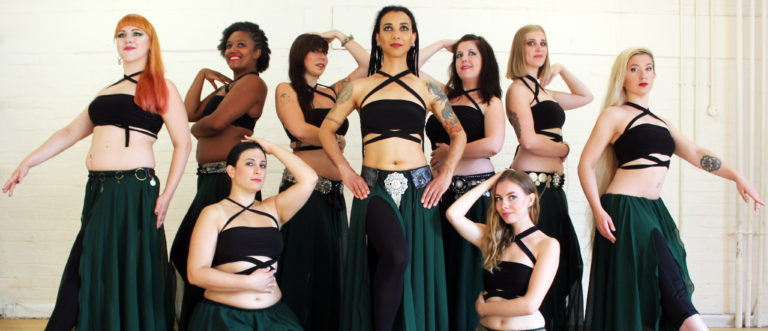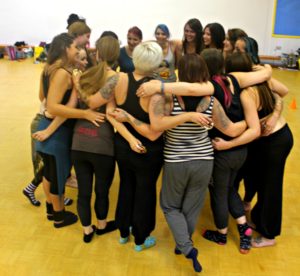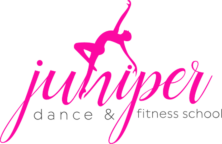I’ve been employed full-time in dance for over eight years now, and I think I have earned the right to call myself an entrepreneur during that time! Today is women’s entrepreneurship day, so I thought I would write a blog post sharing my tips and the skill set you need to sustain a career in this niche corner of the dance market and to keep clients coming back to you for more. Most of this stuff I learned through trial and error, though I have certainly taken plenty of courses and seminars to support my knowledge along the way. When people learn I have a doctorate in Management (only in name, it’s really in Work Psychology), they think that explains why I’ve been at this for so long successfully, but it’s had much less of an impact than people give it credit for. Mostly I think it is a combination of innate skills I have developed throughout my whole life and knowing who I am and being comfortable with that person (most of the time!). I’m not saying that it has been easy, cos it really hasn’t! But maybe some of my experience will help you if you’re thinking about, or are already transitioning, to a career in dance or fitness. Or simply being self-employed.
You need to be determined
When I was talking about skills I’ve developed my whole life, this is one of them. I recently shared a post on the Juniper Dance & Fitness School Instagram page about my PhD in Management, and I wrote about how my high school Psychology teacher told me I’d never study Psychology at university. So of course, I proved her wrong by not only studying at Undergrad, but also getting a Masters and a PhD in a branch of it. My entire life has consisted of these battles. Throughout high school I constantly had to prove my worth and go against the grain to get the things I wanted. My mother would often say that everything I achieved in my education was due to my determination to succeed. Despite going to a highly regarded state school, there was still considerable social hierarchy at play, and I was frequently reminded of how average a student I was (for the most part). I had to work twice as hard in GCSE Dance because the teacher didn’t think I was good enough to be there. They wouldn’t run an A Level in German for only five students, so I advocated for myself and took the A Level at college by going to night classes. Taking an A Level somewhere else meant I had tons of free periods at school, so I was bored – so I fought my way into A Level Art class (just for something to do), years after the head of Art had discouraged me from the GCSE because I wasn’t good enough. In fact, my A Level teacher was disappointed I wouldn’t be studying Art at uni. Everything I did as part of my education was because I was determined. I was determined to get that degree in Psychology, I was determined to take a Masters in Work Psychology, and although it wasn’t in my initial plan, I ended up being determined to finish the damn PhD I’d signed myself up for! And when I finished it, I was determined that I was not going to spend the next 40 years in employment as an academic, hahaha! If you want something, you need to go out and get it, no matter how much people tell you that you can’t. You can. You just need to believe in yourself and put in the action plan to get yourself there.

You need to be able to identify gaps in the market
I don’t think I’m a particularly innovative person, but I’m a student before I’m a teacher. I’ve always been interested in learning and bettering myself, so when I’m trying to think of new products or services I can offer, I try to put myself in my student headset. And this has resulted in some of my most popular services. In marketing they always tell you to find out what problems your clients have and to create something that fixes that problem. I also highly recommend Austin Kleon’s book ‘Steal Like An Artist’.
I wanted to teach group choreographies but my weekly classes were so sporadically attended by people I could never get to the end of a dance. I also realised that (as it had been a good long while) I missed dancing in groups. And in a dance style that is so focused on performing solo and developing as a soloist, I knew there must be others like me that just wanted to dance with their friends. So, I made Juniper Project – a choreography project for community dancers to participate in a major showcase and to be on stage in a group instead of the terrifying solo. This is not my original idea. I took an intensive with Olivia Kissel based on this same premise – learn a dance in advance and put it all together with the group in a short space of time and then perform it. With her blessing, I emulated her offering through Juniper Project and I ran with it. I had no idea if it would be successful, but it was, and continues to be seven years later. Even during the height of the pandemic, people were writing to me to ask when auditions for Juniper would open for 2020.
Around five years ago I took an intensive with one of my teachers in the US. I freaking loved getting to work with her for six long days, to drill technique and get my ass handed to me. But honestly, I sat on the plane home and I felt disappointed. The information was great, but I didn’t get what I so badly craved at that time. I needed someone to tell me where to go next – how to find out who I was as a dancer, what I had to say. I needed someone who cared about what was happening in my dancing, that would give a shit about me beyond the dollars I was handing over. I wanted a mentor. And she wasn’t prepared to be that for me. And I started reflecting on how I’d spent pretty much my entire life seeking out mentors and being ignored or rejected or just not receiving the response I’d hoped for (aside from my PhD supervisor who is still one of the most amazing humans I’ve ever encountered). I felt like almost every single person I admired and respected didn’t actually care about my dancing that much. And that’s not a bad reflection on them. It’s hard to mentor someone who’s on the other side of the world. It’s hard to keep them in your thoughts and work on yourself at the same time and it’s really hard to step up to people’s internal expectations of you. Especially when Alexis isn’t the only dancer that wants you as a mentor. Instead of returning home and feeling pumped, I felt disappointed and deflated – I was on my own. Again. Like always. And I figured – if I feel this way, there are probably other people who feel this way too. So, I created the Tribal Fusion Education Programme (I know, I’ll probably change the name at some point – it’s a point of reflection right now!). The TFEP was like nothing else out there at the time. While everyone else was running week-long intensives packed to the brim with technique, I took a different approach. I wanted to create a programme where we met every few months and worked on technique, musicality, staging and – something that was really missing from the majority of training programmes at the time – how to give and receive feedback. Everyone had to work on their own solo piece and be prepared to be vulnerable and accept feedback on their work in progress. The dancers that have participated in this got something that I never received growing up in this dance form – honest and constructive feedback from their teacher and their peers. I hope that everyone that has gone through the programme (and the part 2 that happened last year) feels like I gave a shit about their dancing and where they were going with it. I might not have succeeded with every single person that has gone through, but my aim was to be someone who gave a shit in a way I’d never felt that I’d had in a teacher.
In 2019 I launched JDFS Online – ok, not a new concept at all. An online subscription service for pre-recorded content? People have been doing that for years already. But it filled some kind of gap, because I have subscribers engaging with my content. I was told regularly – ‘I’d be in your class every week if I lived by you’ – so I made an online platform so people could come to me whenever was convenient. If I’d had the foresight for what would happen with Coronavirus, I’d have been teaching live online classes over a year ago!
I launched a festival in my hometown because I wanted people to come to me instead of always travelling for workshops and because the Midlands had gone pretty quiet when it came to education opportunities in this dance. Also because I wanted to study with Manca Pavli and no one else was bringing her to the UK. It’s now one of the biggest fusion bellydance festivals in Europe a decade later. I clearly remember the ‘Oh my god, if this flops I’m going to lose so much money’ conversation I had in my head, and continue to have every year since! Oh, and I launched an online festival during the pandemic to keep the community active and together. Now they’re flooded with online options, but no one else was stepping up at the time, so I did it.
I’m not smart, I’m not innovative – I just look at myself as a student and ask, ‘What would I want in this situation?’ – then I create something that addresses that. And because they’re also students of dance, people respond to it. Everything worth doing has already been done – so steal like an artist – take something and put your spin on it. And do so in service of your clients and your community.

Be unashamedly yourself
I’m kind of a paradoxical human. I’m an extroverted introvert – I’m friendly and approachable but I’m also socially awkward and have chronic anxiety. I love being around people, until I don’t. But most of all, I’m unashamedly myself. A dance colleague told me that I should stop posting so much of my personal life on Instagram and Facebook and claim my personal accounts as an extension of my business. I balked at the implication that oversharing will lose me business. I have a business page. Actually I have several. I started my Facebook page as a way to make connections in the dance community when I was a baby dancer because I didn’t know anyone. I never set out to be a teacher, I just wanted to make friends. I resisted Instagram for ages because I didn’t have a smart phone, and when I got one the camera was rubbish. But I love IG. It’s amazing. I’m visual so it’s a great platform for me. And as much as people like to think that being revered is something to strive for, that appearing professional takes precedence over sharing your life with your customers, I think that’s bullshit. Look at how we engage with celebrities – we follow them and want to know what’s going on in their lives as much as what they’re doing professionally. Who are they dating? What do their kids look like? Oh cool, they’re in that new movie! Where did they get that dress from? I don’t follow many celebrities on social media, but the ones I do follow tend to share their ordinary lives as much as they sell me their product. If they were constantly selling to me, they’d totally turn me off. My IG page – @alexis.southall if you want to follow me – is unashamedly me. I post my holiday photos, pics where I think I look pretty, my latest Eleven cosplay, what cake I just bought, pics of me snuggling with my beloved and cute cat photos. And I post dance videos, my class info, what workshops I’m teaching next. I refuse to make that page purely professional – I have a page for that. It’s @juniperdancefitness if you prefer to follow me there. I post personal snippets there too, but perhaps less so. Because @alexis.southall was my personal page and always will be. And I think the fact that I post personal stuff is why people engage with me as a businesswoman. They know I have the same fears and insecurities as them because I’ll damn well post about them when I’m feeling them. I’m not afraid to tell you I had a panic attack because I was going to be five minutes late to Jazz class (happened), or that I feel like an imposter (almost constantly), or that I don’t feel like I have anything left to teach people (also almost constantly, but obviously not true). I’m not afraid to tell you that a cancer scare two years ago left me bereft – depressed, comfort eating, drinking too regularly. I’m not afraid to tell you that the major reason I got super skinny last year is because I was so ill with acid reflux that I couldn’t eat. I’m honest about who I am as a person – the good and the bad. I’m a nerd who likes dressing up as Eleven from Stranger Things, I swear like a sailor, I drink waaaaaaaay too much tea and I love to travel. This is who I am. And people relate to those things. People reached out to me when I was open about how much I was struggling with depression after my cancer scare to tell me they had similar experiences and felt heard. People reach out to me when I talk about imposter syndrome and not knowing what the hell I’m doing anymore and when I write about crying my eyes out in yoga class in front of 20 people because I managed to let go of something that was hurting me. I’ll never stop being open about who I am, because nobody buys your product/service, they buy you. They buy you because they relate to you. I have realised that more and more over the years. I’ve got students that have been with me for almost a decade and I find myself asking – why are they still coming to me? They’re better dancers than I am now, I feel like I have given them pretty much everything I can give them from an educational standpoint, and honestly they could get some of this shit from any fusion bellydance teacher in the world, why are they still coming to me? Because they’re not buying my product. They’re buying me. And your clients will buy from you because they like you and relate to you. Write like you, look like you, and share who you are – don’t hide behind some bullshit veil of professionalism. Be professional, yes. But don’t do it to the detriment of showing who you really are. That way, you’ll attract the people you actually want to work with, not the people you grit your teeth every time you have to train them and count down the seconds until you’re free of them. And this is not to say your product/service doesn’t need to be good or provide value – it does. But your personality will be the deciding factor on whether someone buys from you or not. If they don’t relate to you, or see something of themselves in you, they won’t be interested.

Define what success means to you
Success might be having 5 people regularly attending your weekly class in the town you live in. It might be having a group to perform with at a hafla. It might be being an international superstar that everyone wants at their event. Success means different things to different people. And sometimes we need to redefine what success means to us. I have been redefining what success looks like to me since I started this dance. First, I wanted to be a solo performer – getting a solo performance at a hafla was my measure of success. Then it was performing in a show outside of my area. Then abroad. I reluctantly became a teacher, but when I accepted that as a path I was taking it was having some people coming to my classes every week. Then it was being invited to teach a workshop locally. Then nationally. Then internationally. Then I started having ridiculous measures of success, like, ‘I’ll know I’ve made it if I perform on stage with Zoe Jakes’ (that has happened now, multiple times). Now success looks to me like ‘continuing to do this thing that I love for a living for one more year’, and ‘having my students surpass me in skill’, and ‘helping people to find their voice as dancers’. Your measures of success will change over the years, and you can’t compare them to anyone else’s. Will I ever sell out a workshop of 100 people? Unlikely. But that’s not what success looks like to me. Define what it looks like right now, and when you’ve succeeded and relished in your success for a while, find a new measure of success to keep you motivated. And don’t ever expect to just get handed your success – you need to be willing to work for it. Nobody owes you anything – remember that (see determination).
Be passionate
Above all else, you obviously need to be passionate about what you’re doing. I eat, sleep and breathe dance. It’s one of the longest relationships I’ve had in my life. At times it has been all consuming to the point that I’ve had to re-evaluate how I engage in it and what I’m willing to sacrifice for it. And I’ve made a lot of sacrifices for dance. I’ve missed seeing my nieces grow up, I’ve delayed major life decisions to keep working in this for one more year. I’ve missed birthdays, weddings, anniversaries. Because I love dance, it’s important to me. And I love my clients and they’re important to me too. And I try to make sure that passion shines through in everything I do. And sometimes I pour my heart and soul into something and it flops. And that’s ok, because mistakes and errors in judgement are going to happen along the way. It’s all a learning experience. But if you’re not passionate about this, and you’re not willing to show people that, why are you even trying to make a career in dance in the first place? That passion will carry you through all the moments that you ask yourself why the hell you’re doing this to yourself again when things aren’t working out.
These of course are not the only keys to becoming a successful entrepreneur. But these are the things that stand out to me as being important. You also need to be self-motivated, know your superpower and find a niche, be willing to take risks, be flexible, be reasonably good with money… dozens of additional skills. We’re in a niche within a niche, which means finding a continuous flow of clients is hard. But it’s also our superpower – no matter what anyone tells you, there’s room for everyone, even in a very tight niche. You just need to find exactly what makes your offering special. Spoiler alert: It’s you!
